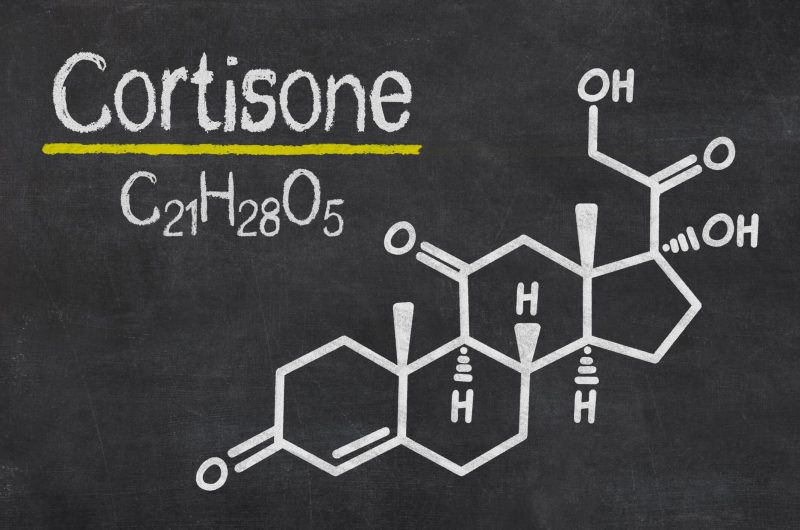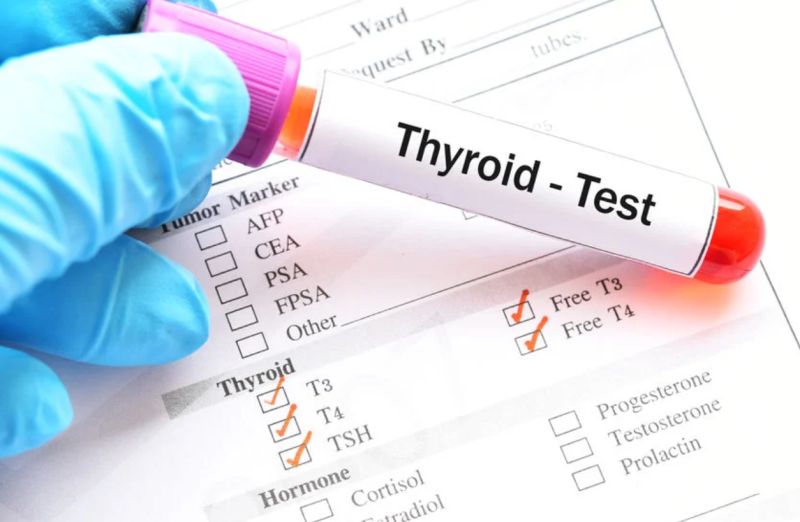
Cortisol is a hormone that is produced in the adrenal gland. This serves to increase the sugar level in the blood, but it has the drawback that it decreases bone formation and can cause some diseases, such as being overweight. High cortisol in the body is known as “hypercortisolemia.”
This syndrome leads to bodily stress and a concentration of fat, elevation of blood pressure, and art rate. Experts point out that the messenger receptors are in almost all body tissues: nervous, immune, cardiovascular, respiratory, reproductive, musculoskeletal, and integumentary systems.
Because of this, a mismatch in hormone levels can affect all of these systems. Initially, there are various signals that the body emits when it has an imbalance like this. Please keep reading and discover other symptoms that we detail below.
Contents
Cortisol levels in the body and health: when is it a problem?
The first thing to clarify is that cortisol levels vary throughout the day. According to the evidence, its concentration in the blood increases early in the morning and reaches its maximum level around 8 am. It remains more or less stable during the day, then decreases slightly at night and during the first sleep phases.
The hormone is related to stress. Experts have found that its release continues hours after the stressful catalyst, so its homeostasis may take time. The hormone is distributed to fluids such as saliva, cerebrospinal fluid, sweat, hair, and urine. These routes can then measure it, saliva being the most common.
In short, cortisol varies according to the time of day and stressful situations. This is considered normal. It is said that there is a problem when its increase is postponed for days, and it does so regardless of the mechanisms that regulate it.
Its positive dysregulation is known as “hypercortisolemia.” Excessive exposure of the tissues to this is called “hypercortisolism .” These are different states, so they should not be confused. If hypercortisolism persists, it can lead to Cushing’s syndrome.
11 signs of high cortisol in the body
Although they do not appear in all cases, some signs could indicate that something is not going well in your body and that you may have high cortisol. Do you want to know what they are? Go for it!
1. Sudden Weight Gain
 Weight gain is one of the first symptoms of excess cortisol. This is especially noticeable in the upper body, as fat accumulates in places like the shoulders, chest, and back.
Weight gain is one of the first symptoms of excess cortisol. This is especially noticeable in the upper body, as fat accumulates in places like the shoulders, chest, and back.
The strange thing about the situation is that the person’s arms and legs will still be skinny. A redistribution of body fat occurs.
A paper published in Progress in Cardiovascular Diseases found that fructose in the brain stimulates increased cortisol release, which could lead to general insulin resistance and weight gain. Similarly, it is established that the hormone increases the consumption of foods with fats and sugars, another way that explains this symptom.
2. Skin symptoms
The skin is also affected by hypercortisolemia. Therefore, the person may present the following skin symptoms:
- Acne.
- Bruising.
- Increased facial and body hair.
- Purple, streak-like lesions on the breasts, abdomen, and thighs.
In addition, it is known that it can cause delayed healing through multiple pathways and alteration of the skin barrier and dryness. It has also been suggested that it can cause inflammation, thinning, and skin aging.
3. Muscle and bone symptoms
Likewise, high cortisol levels in the body affect the health of muscles and bones. In short, the bone structure is weakened, increasing the risk of fractures, especially in the ribs and spine. There is also a risk that the patient will quickly develop muscle tears and related injuries.
For you to be able to measure their impact, osteoporotic fractures are often a clinical symptom of asymptomatic hypercortisolism through other pathways. Its high concentrations have been associated with loss of grip strength in older people.
4. Deficiency in the immune system

The thymus gland, essential for the functioning of the immune system in the first years of life, is affected by cortisol. This hormone can cause cell death and cause the immune system to attack body tissues instead of viruses.
- Asthma and allergies are the most common symptoms of failure in this system.
- However, the problem can become even more severe, leading to lupus, Crohn’s disease, and fibromyalgia.
Recently, it has been suggested that the messenger may potentiate immune responses. Thus, it may be behind systemic inflammatory processes, but more studies are still needed.
5. Mood swings and mood disorders
Anxiety is one of the most common symptoms that usually appear when someone is subjected to high-stress levels. As the evidence points out, cortisol is considered one of the most critical markers in anxiety disorders.
6. Insomnia and other sleep disorders
Cortisol maintains a secretion cycle that decreases at night. Studies suggest that daytime cortisol secretion helps maintain wakefulness, so an increase in its nocturnal production could lead to chronic insomnia. In particular, it can do it with greater force in older people.
Some experts believe that the insomnia of people with diabetes is explained by this pathway, at least partially. However, the results are not conclusive, so more studies are necessary in this regard.7. Altered thyroid function
A study published in Thyroid Research reported a positive relationship between elevated levels of thyroid-stimulating hormone (TSH) and cortisol in healthy men and women. The values are still within normal ranges but may be higher in susceptible people.
Similarly, people with Cushing’s syndrome have been reported to develop abnormalities in the hypothalamic-pituitary-thyroid axis. This leads to thyroid dysfunction, which is accentuated in patients under treatment.
8. Decreased Insulin Production
A study published in PLOS ONE evaluated the relationship between high serum cortisol levels and decreased insulin secretion. He found that the subjects with the highest levels had a decrease in the second hormone. The impact is slight but can be significant in people with insulin resistance or a family history of diabetes.
9. High blood pressure
Although its impact is slight, there is evidence that positive hormone imbalances can affect the increase in blood pressure. As in the previous case, this may be greater in people predisposed to or already suffering from hypertension.
10. Cardiovascular complications
Some of the symptoms of high cortisol in the body that we have mentioned mediate the development of cardiac manifestations. For example, obesity and increased blood pressure. Cardiovascular problems are the leading cause of morbidity and mortality in patients with Cushing’s syndrome.
11. Headache
It has been established that people with chronic migraine have higher cortisol levels. It is not well known if this is a consequence of the migraine or vice versa. In any case, a permanent hormone elevation can generate minor headaches, as occurs during stress.
What to do if you have a high cortisol level?
See your doctor if you have one or more of the above symptoms. This way, you will know if you have high cortisol levels and, more importantly, what is behind it.
The average values of this hormone in the blood range from 5 to 25 micrograms per deciliter; they may also be stated as 140 to 690 nanomoles/liter.
The test is usually done in the morning, and laboratories may use different values than those indicated. Check with your doctor about available alternatives, and remember that high cortisol isn’t explained by Cushing’s syndrome alone. Stressful periods at work, study, and family life are enough to justify the maladjustment.
In general, this is the most common explanation for hormonal disruption. Underlying diseases can also be a catalyst, and less common ones are tumors on the adrenal glands. It has been suggested that contraceptive drugs can raise their levels, and corticosteroids can treat different diseases.
Seven tips to balance cortisol in the body
Here are tips to lower cortisol levels and lead a healthier life.
1. Try to sleep more
Take care of your sleep hygiene, keep schedules, perform rituals to relax before bed, have a light dinner and preferably 3 hours before bed (at least), and do everything possible to rest well every night. Find the ritual that you like the most and put it into practice.
Remember that, apart from reducing cortisol levels in the body, enjoying a good night’s rest will allow you to look younger and be healthier.
2. Keep blood sugar levels stable
Maintain a balanced diet rich in nutritious foods, and leave out industrial, processed, frozen and related drinks. Consume fruits daily, and prepare complete carbohydrates, proteins, and fiber meals to control sugar.
Consuming foods rich in vitamin B, calcium, magnesium, chromium, zinc, vitamin C, and alpha-lipoic acid (ALA) is also advisable.
3. Say goodbye to coffee

Caffeine tends to increase the level of cortisol in the blood in people at rest or under mental stress. However, the effects in some cases can last for 18 hours. If you intend to decrease your catabolic metabolism and increase your anabolic metabolism, stop drinking more coffee.
4. Exercise
The well-known benefits of having a regular exercise routine, such as gaining muscle mass and increasing the production of serotonin and dopamine, will make you less likely to suffer from anxiety or depression. In addition, exercising will help you avoid cortisol imbalance in your body.
5. Stay hydrated
Do not forget that the body needs a certain amount of water daily to perform its functions correctly; this includes hormonal balance.
6. Avoid chronic alcohol consumption
This substance also stimulates cortisol production through stimulation of the hypothalamic-pituitary-adrenal gland axis, according to research published by The Journal of Clinical Endocrinology and Metabolism.
7. Control stressful situations
We have already pointed out that stressful situations are the leading cause of elevated cortisol. Thus, try to reduce the participation that stress has in your daily life.
Other things you can do to reduce high cortisol in the body
One of the ways to prevent high cortisol levels from playing tricks on you is not to let stressful situations get the better of you. Although there are many ways to control it, you can try the following:
- Learn breathing techniques and use them. You will see how deep breathing daily will benefit you not only on an emotional but also on a biological level.
- Meditate daily or opt for any other relaxation technique.
- Play, walk, and pet your pet for at least a while daily. If you don’t have one, consider adopting a dog or cat responsibly. You will see how it makes a difference.
- Try to distract yourself from your daily worries. Listen to music, watch a funny movie, read a book, have a good time with friends or family, or find a new hobby.
Remember that the symptoms described above can be explained in many ways. Thus, the best thing you can do is consult a professional, especially when the manifestations are very noticeable.